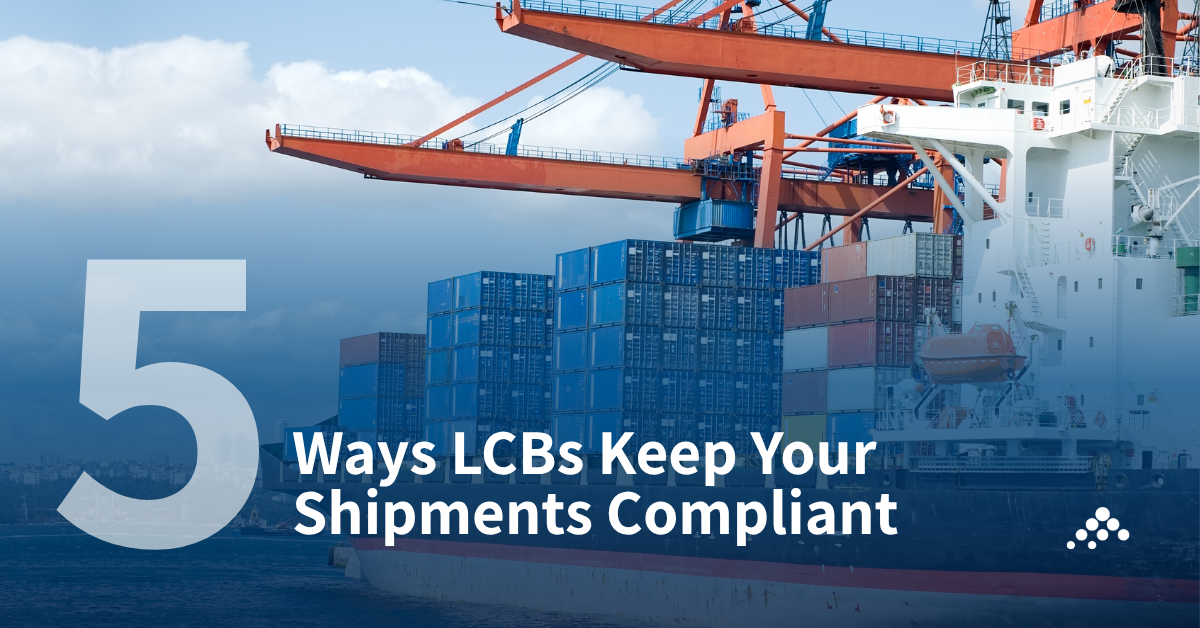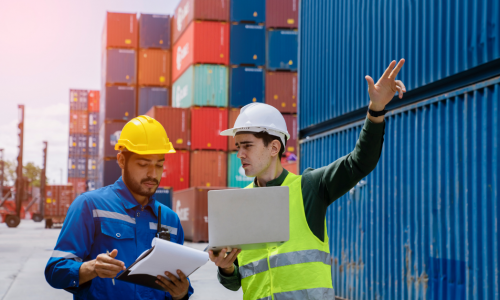- Brokerage & Managed Transportation
- Forwarding
- On-Demand
- Mexico
- Industries
- About Us
- Resources
- USA Jet
- Contact Us
Headquarters
info@ascentlogistics.com
+1 800.614.1348
2068 E Street
Belleville, MI 48111
- Brokerage & Managed Transportation
- Forwarding
- On-Demand
- Mexico
- Industries
- About Us
- Resources
- USA Jet
- Contact Us
Headquarters
info@ascentlogistics.com
+1 800.614.1348
2068 E Street
Belleville, MI 48111
5 Ways Licensed Customs Brokers Keep Your Shipments Compliant
06/11/2025

Customs clearance is often seen as just one step in international shipping. In reality, it’s a complex and critical process that requires deep knowledge, sharp attention to detail and the ability to respond quickly when regulations shift.
Licensed Customs Brokers (LCBs) are the experts behind that process. They help goods move across borders legally, efficiently and with minimal risk by navigating the thousands of regulations that govern global trade. Whether you are moving consumer products, industrial components or time-sensitive cargo, an LCB plays an important role in keeping shipments on track.
Becoming an LCB is no easy task. Fewer than 15% of the roughly 2,600 annual test-takers pass the Customs Broker Exam, making it one of the toughest professional exams in the U.S.
Today, that expertise is more valuable than ever. With a new wave of tariff changes, importers are facing greater uncertainty and tighter timelines. LCBs are fielding more questions than ever as businesses work to understand shifting rules and minimize the impact on their supply chains.
Let’s take a closer look at what LCBs manage every day.
1. Accurately classify every product
One of the most important steps in the customs clearance process is assigning the correct Harmonized Tariff Schedule (HTS) code to each imported product. This classification determines duty rates, trade program eligibility and required documentation.
LCBs have the knowledge to sort through thousands of HTS codes, which are often updated. Even small mistakes, especially with products that appear similar, can lead to delays, penalties or incorrect duty charges. LCBs help avoid setbacks and keep your shipments on track.
2. Interpret rules from multiple agencies
Clearance often involves more than just customs. Depending on the product, regulations may apply from agencies like the FDA, USDA, EPA, ATF, NHTSA and others. LCBs know how to apply these rules to keep shipments compliant.
For example, a company importing auto parts may not just need to meet customs requirements. If the parts are safety-related, they also must comply with NHTSA regulations. If you are importing consumer goods like electronics, chemical components or even packaging materials, additional reviews from agencies like the EPA or CPSC could apply. Missing even one agency’s requirement can hold up your entire shipment from being delivered.


3. Stay ahead of regulatory changes
Trade regulations are constantly changing, and even small shifts can have a major impact on how goods move across borders. LCBs are expected to track new tariffs, rule changes and agency updates as they happen, often with very little lead time.
This can include monitoring announcements from multiple government sources, interpreting how changes apply to different commodities and making immediate adjustments to entries and compliance procedures. Staying ahead of these shifts helps prevent costly errors and clearance delays that could disrupt delivery timelines.
LCBs are also expected to stay current with the 3-volume Code of Federal Regulations (Title 19 CFR), which outlines the full body of customs regulations. Understanding these rules is essential to keeping shipments compliant and responding quickly when policies shift.
4. Manage specialized entry types
Customs entries are not one-size-fits-all. LCBs are responsible for selecting the right type of entry based on the goods, how they are being used and how long they will stay in the country. Options like Foreign Trade Zones (FTZs), bonded warehouse entries, Carnets, Temporary Import Bonds (TIBs) and Drawback claims all have different benefits and requirements.
For example, using a TIB allows certain goods to be imported temporarily without paying duties, as long as they are re-exported within a set time frame. Similarly, Carnets allow companies to move professional equipment or trade show materials across borders without paying duties at each stop.
LCBs make sure each shipment is set up under the best available option to meet all regulatory requirements.


5. Reduce risk with compliance support and reporting
LCBs do more than file paperwork. They help shape stronger import strategies by reviewing documents, prepping for audits and delivering reports that give you a clear view of your trade activity. This hands-on support helps spot issues before they become problems, cuts down the risk of delays or penalties and tightens up your internal processes.
With the right broker on your side, your goods keep moving, your team stays focused and your supply chain avoids costly disruptions. The work may happen behind the scenes, but the impact is felt across your entire operation.
Expertise that supports your business
At Ascent Global Logistics, we know that customs compliance is critical to your success. That’s why our International Freight Forwarding team includes a team of 13 Licensed Customs Brokers. Their expertise helps keep freight moving, no matter how complex the shipment or how quickly regulations change.
If you’d like to get connected or have a customs question, our team is here to help. Contact us today.
Tags:
April 30, 2024
Thank you for contacting Ascent!
A member of our team will be in contact within a few business hours.
Okay